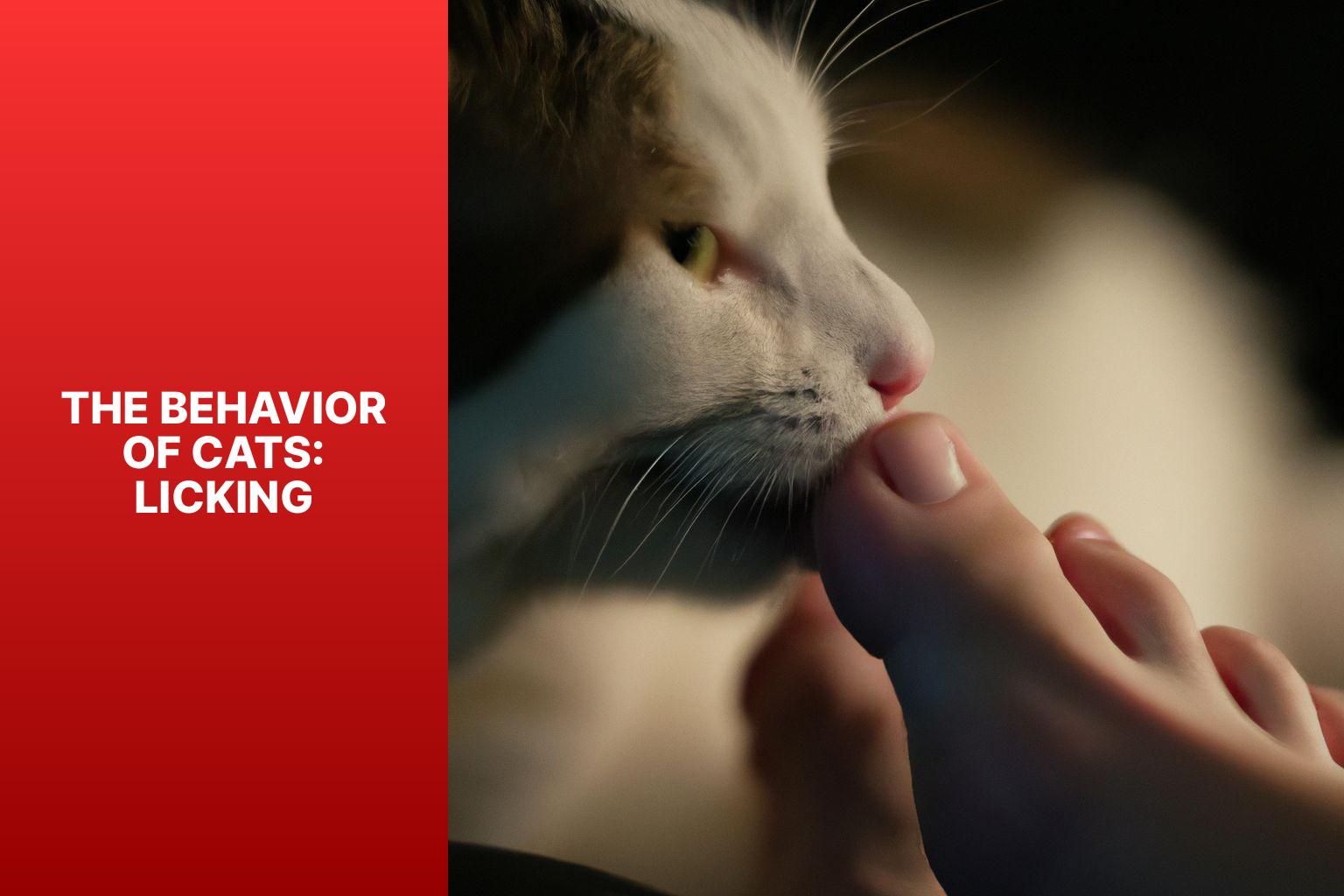Cats are known for their peculiar behaviors, and one common behavior that cat owners often wonder about is licking. Cats engage in licking for various reasons, ranging from grooming themselves to showing affection. In the case of licking feet, cat behavior experts have identified several possible explanations.
Understanding the behavior of cats and their reasons for licking is essential in providing proper care and addressing any concerns. Some of the common motives behind a cat’s licking behavior include:
1. Grooming Behavior: Cats are naturally clean animals and spend a significant amount of time grooming themselves. Licking their own fur helps to remove dirt, parasites, and maintain a clean coat.
2. Showing Affection: Licking can also be a way for cats to show affection towards their owners. It is a behavior similar to how they would groom their fellow feline companions.
3. Marking Territory: Cats have scent glands in their mouths, and licking can serve as a way to mark their territory by leaving behind their scent on objects or individuals.
So, why does your cat specifically lick your feet? There could be a few possible reasons:
1. Salt Attraction: Sweat contains salt, and cats may be attracted to the salty taste on your feet. Licking your feet could be their way of exploring the interesting flavors that they find appealing.
2. Scent and Recognition: Your feet carry your unique scent, and licking them can be a way for your cat to bond with you and establish familiarity.
3. Attention Seeking: Cats are known to seek attention, and licking your feet may be their way of seeking your attention or trying to initiate interaction.
It is important to note that occasional foot licking behavior is generally considered normal for cats. If the licking becomes excessive or is accompanied by other concerning symptoms, it may be worth investigating further. Excessive licking, skin irritation, or allergies may indicate underlying issues that require attention. stress or anxiety can also manifest through excessive or obsessive licking behavior.
Key takeaway:
- Cats lick to groom themselves, show affection, and mark territory.
- When your cat licks your feet, it may be attracted to the salt on your skin and using scent for recognition.
- Cat licking can also be a way for them to seek attention from you.
The Behavior of Cats: Licking
Photo Credits: Www.Catcornerblog.Com by John Campbell
The behavior of cats, specifically their licking habits, can vary. Let’s explore some interesting facts about cat licking:
– Licking is a natural behavior in cats, serving as a means for them to keep themselves clean. Their barbed tongues are designed to effectively remove dirt and debris from their fur.
– Licking is not only limited to self-grooming but also plays a role in social interactions among cats. They often lick each other as a form of social grooming, which helps strengthen their social bonds.
– Interestingly, licking can have a calming effect on cats, helping them relax and alleviate anxiety or stress.
– Cats utilize their tongues as a way to explore and taste their surroundings, allowing them to gather information about their environment.
– Some cats may display licking behavior towards their owners as a gesture of affection and trust, further highlighting the bond between humans and felines.
Fun fact: Cats possess rough tongues covered in tiny, backward-facing papillae. This unique feature enables them to effectively groom their fur and remove loose or dead hair.
In summary, the behavior of cats, specifically their licking tendencies, serves multiple purposes and is a fascinating aspect of their nature.
Why Do Cats Lick?
Cats are fascinating creatures with peculiar habits, and one behavior that often leaves us puzzled is their licking. In this section, we’ll uncover the mystery behind why cats lick and explore the various reasons behind this behavior. From grooming behavior to showing affection and marking territory, each sub-section will shed light on a different facet of feline licking. Get ready to dive into the intriguing world of cat communication and understand what your furry friend might be trying to tell you through this intriguing behavior.
1. Grooming Behavior
Cats exhibit grooming behavior as a way to maintain their fur hygiene and keep it free from dirt and debris. This natural behavior allows them to spread the oils from their skin onto their fur, resulting in a coat that is soft and shiny. Grooming is essential for cats to ensure proper hygiene. They utilize their tongues to lick their fur and eliminate any loose hair or tangles. Grooming acts as a means for cats to relax and alleviate stress.
Pro-tip: Show support for your cat’s grooming behavior by regularly brushing them. Brushing not only helps eliminate excess fur and prevent hairballs but also strengthens your bond with your cat. It allows you to closely examine their skin for any issues or abnormalities.
2. Showing Affection
To show affection, cats often lick their owners. There are several reasons why cats engage in this behavior:
- Expressing love: Licking is a way for cats to bond with and show love to their owners.
- Grooming behavior: When cats lick their owners, it mimics the grooming behavior they exhibit with other cats, helping to keep their human companions clean and well-groomed.
- Social bonding: Licking promotes closeness and familiarity, which helps to strengthen the social bonds between cats and their owners.
- Marking territory: By licking their owners, cats leave their scent behind, effectively marking their territory.
- Attention seeking: Cats may also lick their owners as a way to seek attention, interaction, playtime, or even treats.
If your cat licks you, rest assured that it is a normal behavior and a sign of love. Embrace and enjoy this affectionate behavior from your feline companion!
3. Marking Territory
Marking territory is a natural behavior for cats. They establish ownership and communicate with other cats by leaving scent markers. Cats mark their territory in three ways:
- Scratching furniture and objects: Cats have scent glands in their paws, so when they scratch, they leave their scent behind to mark their territory.
- Urinating on vertical surfaces: Cats may spray urine on walls or furniture to mark their territory. This behavior is more common in intact male cats, but females and neutered males may also do it.
- Spraying urine: Cats release a small amount of urine onto a vertical surface while standing to mark their territory.
If your cat marks territory in undesirable areas, there are steps you can take to discourage this behavior. Provide appropriate scratching posts and objects to redirect their behavior. Clean marked areas thoroughly to remove the scent markers. You can also consult with a veterinarian or animal behaviorist for further guidance.
Remember, marking territory is natural for cats. If it becomes excessive or causes issues in your home, address the behavior and provide appropriate alternatives for your cat.
Why Does My Cat Lick My Feet?
Ever wondered why your feline friend has a peculiar affinity for licking your feet? In this intriguing exploration, we uncover the reasons behind this curious behavior. From the enticing pull of salt attraction to the intriguing role of scent and recognition, we’ll uncover the hidden motivations behind your cat’s foot-licking habits. We’ll shed light on the possibility of attention-seeking as a motive, as we delve into the fascinating world of feline behavior. Prepare to solve the mystery of “Why does my cat lick my feet?” once and for all!
1. Salt Attraction
Salt Attraction is a common reason why cats lick feet. Cats are attracted to the taste of salt, so they may lick feet for it. Human feet have sweat glands that excrete salt, which is appealing to cats. Another reason why cats may lick feet is due to a mineral imbalance in their diet, as they seek additional sources of minerals. It’s important to note that salt attraction in cats is common and doesn’t necessarily indicate any underlying health issue. Cats are simply drawn to the salty taste on the feet because of their strong sense of taste. If your cat exhibits excessive licking or other concerning behaviors, it’s important to monitor and assess them with the help of a veterinarian.
If you’re worried about your cat’s foot licking behavior, you can try redirecting their attention with alternative toys or activities to keep them engaged. Providing a balanced diet with appropriate mineral content can help minimize their need to seek additional sources of minerals. It’s important to remember that each cat is unique and their licking behavior may vary. If you have any concerns or questions about your cat’s behavior, it’s always best to consult with a veterinarian for personalized advice and guidance.
2. Scent and Recognition
When it comes to cats, licking serves various purposes, including scent and recognition. Here are the reasons cats engage in this behavior:
1. Grooming: Cats groom themselves with their tongues, removing dirt and debris from their fur. This maintains cleanliness and hygiene.
2. Bonding: Licking may signify affection and bonding between cats or between a cat and its owner. It shows love and trust.
3. Communication: Cats have scent glands in their mouths, so when they lick objects or people, they leave their scent behind. This marks their territory and communicates with other cats.
Fact: A cat’s tongue has a rough texture due to tiny barbs called papillae, which helps them groom their fur effectively and remove tangles.
3. Attention Seeking
When it comes to cats, attention-seeking behavior is common.
Cats may engage in attention-seeking behavior such as licking you to bond, seek affection, or get attention.
Positive reinforcement can play a role in reinforcing this behavior.
To address your cat’s attention-seeking licking, you can try redirecting their attention, setting boundaries, and providing scheduled attention.
It is important to remember that attention-seeking licking is a normal behavior for cats, but if it becomes obsessive or causes issues, it is advisable to consult a veterinarian.
Is It Normal For Cats To Lick Feet?
Cats lick feet as part of their natural grooming instinct. This behavior is seen as an affectionate gesture towards their human companion. Is it normal for cats to lick feet?
Cats may lick feet for several reasons. It can be a way for them to bond with their human and release endorphins that create relaxation and pleasure. Feet can also have a salty taste that cats find appealing. Licking feet may also be a form of exploration for cats, as they gather information about their environment.
If you find your cat’s licking behavior bothersome or excessive, redirect their attention to an appropriate alternative like a toy or scratching post. Make sure your feet are clean and free from any harmful substances your cat may ingest during their licking sessions. Understanding their behavior and providing outlets for their grooming instincts can help maintain a harmonious relationship with your feline friend.
How To Respond To Your Cat’s Foot Licking Behavior?
When responding to your cat’s foot licking behavior, follow these steps on how to respond:
1. Observe the behavior: Pay attention to when and where your cat licks your feet.
2. Rule out medical issues: Consult with your veterinarian to ensure no underlying health problems.
3. Redirect the behavior: Provide alternative outlets for grooming needs, like brushes or puzzle toys.
4. Keep feet covered: Wear socks or slippers to create a barrier between your feet and the cat.
5. Provide enrichment: Engage your cat in play and mental stimulation with interactive toys and scratching posts.
6. Positive reinforcement: Reward desired behaviors, i.e., using the scratching post instead of licking your feet.
For example, I once had a cat that would lick my feet after showering. To address this, I redirected her attention to a scratching post and rewarded her when she used it. Gradually, she learned that the scratching post was a more suitable option, and the foot licking behavior decreased.
When Is Cat Licking a Concern?
When cats take licking to the next level, it might leave you wondering when it becomes a concern. In this section, we’ll dig into the different reasons behind excessive cat licking. From obsessive behavior to skin irritation and even stress or anxiety, we’ll uncover what might be causing your furry friend to go overboard with their grooming habits. Get ready to explore the various factors that could be at play when your cat becomes a lick-a-holic!
1. Excessively Obsessive Behavior
Excessively obsessive behavior in cats is a concern. Watch out for these signs:
1. Compulsive licking: If your cat constantly licks itself to the point of hair loss or skin irritation, it may be displaying excessively obsessive behavior.
2. Overgrooming a specific area: Cats may focus their licking on one spot, like their paws or tail, leading to excessive grooming and possible self-injury.
3. Avoidance of other activities: Cats with excessively obsessive behavior may neglect important activities, such as playing or socializing, in favor of continuous licking.
Excessive obsessive behavior in cats can have underlying causes:
1. Anxiety or stress: Cats may use compulsive licking as a coping mechanism when feeling anxious or stressed.
2. Underlying medical conditions: Certain medical conditions, like allergies or skin irritations, can lead to obsessive grooming behavior in cats.
3. Boredom or lack of stimulation: Cats that aren’t adequately entertained or mentally stimulated may resort to excessive licking as a way to occupy themselves.
If you suspect your cat is displaying excessively obsessive behavior, consult with a veterinarian. They can determine the underlying cause and recommend appropriate interventions, which may include behavior modification techniques or medical treatments.
2. Skin Irritation or Allergies
Skin irritation or allergies can cause cats to lick their feet. This behavior may occur if the cat detects a scent or substance on their feet that irritates their skin. There are a few factors to consider when it comes to skin irritation or allergies in cats:
1. Allergens: Cats can have allergies to various things such as fabrics, lotions, detergents, and other substances. It is crucial to identify potential allergens.
2. Dermatitis: Allergies can lead to the development of dermatitis, which is inflammation of the skin. This can cause itching, redness, and discomfort.
3. Infections: Excessive licking of the feet can result in secondary infections. The moisture from licking creates a favorable environment for bacteria or fungi to thrive.
4. Treatment: If you suspect that your cat has skin irritation or allergies, it is recommended to consult a veterinarian for a proper diagnosis and treatment. They may suggest allergy testing or prescribe medication to alleviate the symptoms.
I once had a cat that continuously licked my feet. After observing her behavior, I realized she was sensitive to a particular brand of soap I was using. Switching to a hypoallergenic soap resolved the issue, and she stopped licking my feet. Identifying the underlying cause of skin irritation or allergies is vital for the overall health and well-being of your cat.
3. Stress or Anxiety
When it comes to cats licking feet, stress or anxiety can be significant factors. Here are some things to consider:
1. Body language: Cats may lick their owner’s feet to communicate their stress or anxiety. Pay attention to other signs of stress such as flattened ears, dilated pupils, or tense body posture.
2. Environmental changes: Changes in a cat’s environment can trigger stress or anxiety. This includes moving to a new home, introducing a new pet, or the arrival of a new family member.
3. Lack of stimulation: Cats need mental and physical stimulation to stay happy. If they don’t get enough playtime or enrichment activities, they may resort to licking behavior out of boredom or frustration.
4. Medical issues: Excessive licking can sometimes indicate an underlying medical condition. It’s a good idea to consult a veterinarian to rule out any health problems causing your cat’s stress or anxiety.
To help alleviate your cat’s stress or anxiety, consider these suggestions:
– Provide a safe and soothing environment with hiding spots and vertical spaces.
– Give your cat plenty of toys and interactive playtime for mental stimulation.
– Establish a routine to reduce uncertainty and create a sense of security.
– Use pheromone diffusers or calming sprays to create a relaxed atmosphere.
– If needed, consult with a veterinarian or professional animal behaviorist for guidance and support.
Remember, each cat is unique, so it’s important to observe and understand your cat’s individual needs and personality when managing their stress or anxiety.
Some Facts About Why Cats Lick Feet:
- ✅ Cats lick feet to groom and show affection to their owners. (Source: https://www.hepper.com/why-does-my-cat-lick-my-feet-toes/)
- ✅ Licking feet allows cats to mark their territory and leave their scent. (Source: https://betterwithcats.net/why-do-cats-lick-your-toes/)
- ✅ Cats may lick toes to teach their owners grooming skills, as they learn grooming from their mothers. (Source: https://catvills.com/why-do-cats-lick-toes/)
- ✅ Excessive licking of toes can be a sign of anxiety and stress in cats. (Source: https://betterwithcats.net/why-do-cats-lick-your-toes/)
- ✅ Cats may lick toes to initiate play and engage their hunting instincts. (Source: https://betterwithcats.net/why-do-cats-lick-your-toes/)



